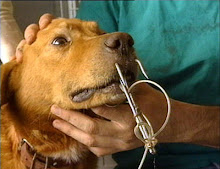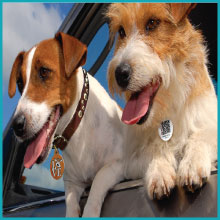Animal Groups Pledge $1.1M for Long-Term Animal Relief Efforts in Haiti
Today, the Animal Relief Coalition for Haiti (ARCH) announced a $1.1 million agreement with the Haitian government aimed at improving animal welfare conditions and repairing the country's damaged veterinary capacity in the aftermath of the devastating earthquake of January 12. The coalition was formed by more than 20 of the world's leading animal welfare groups and is jointly led by the World Society for the Protection of Animals (WSPA) and the International Fund for Animal Welfare (IFAW).
"Our goal is to reach millions of animals in need and have a long-lasting impact for the people of Haiti," said Ian Robinson, IFAW's Director of Emergency Relief. "Cooperating as a group of NGOs gives us a unique opportunity to address public and animal health concerns, across the entire country."
"This operation will be implemented in close cooperation with the Haitian Ministry of Agriculture, Ministry of the Environment, and the Ministry of Health," said James Sawyer, WSPA's Head of Disaster Management. "The results will help an untold number of animals and countless people recover from the disaster and will build resilience to better protect against future disasters."
The ambitious program of work outlined in the agreement includes:
An epidemiology network: Assist the government in protecting people and animals from disease outbreaks. A laboratory and lab workers will be provided to do things such as carry out targeted vaccination campaigns for Rabies, Anthrax and other diseases.
Training of Haitian veterinarians and veterinary health workers; the goal is to train a minimum of 200 animal health workers to address current and future animal welfare problems.
Restoration of the 'cold chain' to allow for effective vaccination campaigns: Haiti had embarked on several ambitious vaccination programs prior to the earthquake. It is now vital to rebuild the infrastructure to keep vaccinations cold up through delivery.
Animal population studies: Haiti's animal demographics have changed dramatically as the result of recent disasters. Accurate, updated survey data will inform coalition work.
The coalition also announced the arrival of a fully-equipped veterinary mobile clinic to Port-au-Prince. The donated unit will support ARCH's animal rescue efforts that have already treated over 4,000 animals including dogs, cats, goats, cattle, horses, and other animals.
Coalition members arrived in Port-au-Prince days after the 7.0-magnitude earthquake shook the Haitian capital to provide immediate medical aid to the stricken animals. Teams continue to treat injured and sick animals with medications including antibiotics and de-worming medicine, they are also providing anthrax and rabies vaccinations for thousands of animals. According to the Haitian Ministry of Agriculture, there is an estimated 5 million heads of livestock in Haiti (not including poultry), and approximately 500,000 dogs living in the capital city of Port-au-Prince.
About ARCH (Animal Relief Coalition for Haiti)
Animal welfare organizations formed the Animal Relief Coalition for Haiti (ARCH) so that we could work together to bring aid to as many animals, and in as short a time, as possible. At present, ARCH partners include: International Fund for Animal Welfare (IFAW), World Society for Protection of Animals (WSPA), American Humane Association, Best Friends Animal Society, Royal Society for the Prevention of Cruelty to Animals (RSPCA), In Defense of Animals, American Veterinary Medical Association, American Veterinary Medical Foundation (AVMF), Antigua and Barbuda Humane Society, ASPCA, United Animal Nations, Kinship Circle, One Voice, Swiss Animal Protection, Palo Alto Humane Society (PAHS), People for the Ethical Treatment of Animals (PETA), Finnish Federation for Animal Welfare Associations, Animal Medical Care Foundation (AMCF), Petfinder.com Foundation, Mayhew International, and Last Chance for Animals.
Thursday, March 4, 2010
Subscribe to:
Post Comments (Atom)




No comments:
Post a Comment